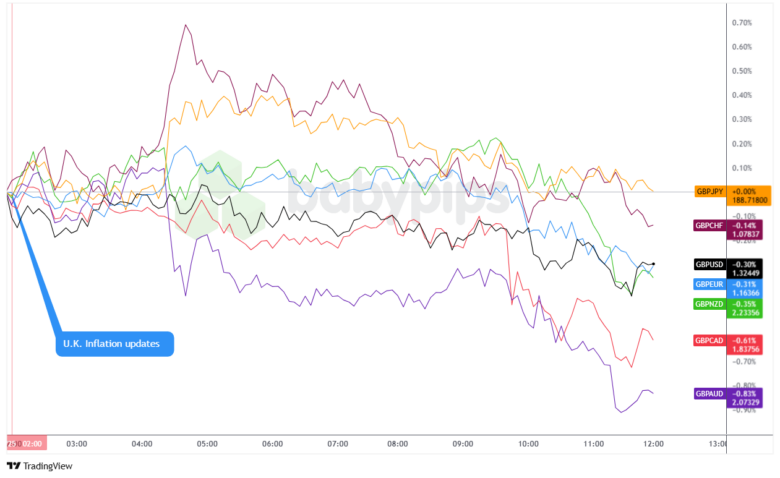The U.K.’s Consumer Prices Index (CPI) inflation rate dropped to 2.6% in March, down from 2.8% in February, according to data released by the Office for National Statistics (ONS) today. This marks the lowest inflation reading since December and comes in below economists’ expectations of 2.7%.
Key points from the ONS report:
- Headline CPI fell to 2.6% in March from 2.8% in February
- Core inflation (excluding food, energy, alcohol and tobacco) eased to 3.4% from 3.5%
- Services inflation decreased notably to 4.7% from 5.0%
- Recreation and culture, motor fuels, and restaurants and hotels contributed to the slowdown
- Clothing and footwear prices rose, providing the largest offsetting upward effect
Link to ONS report (March 2025)
“Inflation eased again in March, driven by a variety of factors including falling fuel prices and unchanged food costs compared with the price rises we saw this time last year,” ONS Chief Economist Grant Fitzner said. The average price of petrol fell by 1.6 pence per litre between February and March to 137.5 pence per litre, down from 144.8 pence per litre in March 2024.
The drop in services inflation to 4.7% is particularly significant as it’s a key metric watched by the Bank of England for signs of persistent price pressures in the economy.
Market Reactions
British pound vs. Major Currencies: 5-min

Overlay of GBP vs. Major Currencies Chart by TradingView
The British pound showed a muted reaction to the inflation data, trading choppily with no clear directional bias immediately following the release. While GBP initially strengthened against some major currencies, the moves were modest throughout early London session trade.
GBP started to turn slightly lower ahead of the U.S. session, possibly on traders increasing their bets on interest rate cuts following the release, now pricing in at least three quarter-point reductions by the end of the year, with the first cut widely expected at the Bank of England’s next meeting on May 8.
We also saw a general rise in broad risk-off sentiment as global tariff tensions continued to escalate on the session, this time sparked by news of the U.S. government requiring Nvidia a license to export to China and China demanding more respect from the U.S. Risk aversion may have brought some pressure to GBP as well given its usual tendency to act as a beta currency in most broad market risk terms (i.e., falls when broad risk sentiment is net negative and vice versa).
The relatively subdued market response likely reflects that while the inflation reading was slightly better than expected in terms of inflation moving in the right direction for economic resilience, investors are already focused on the April inflation data, which will capture the impact of various price increases that took effect at the start of the fiscal year.
